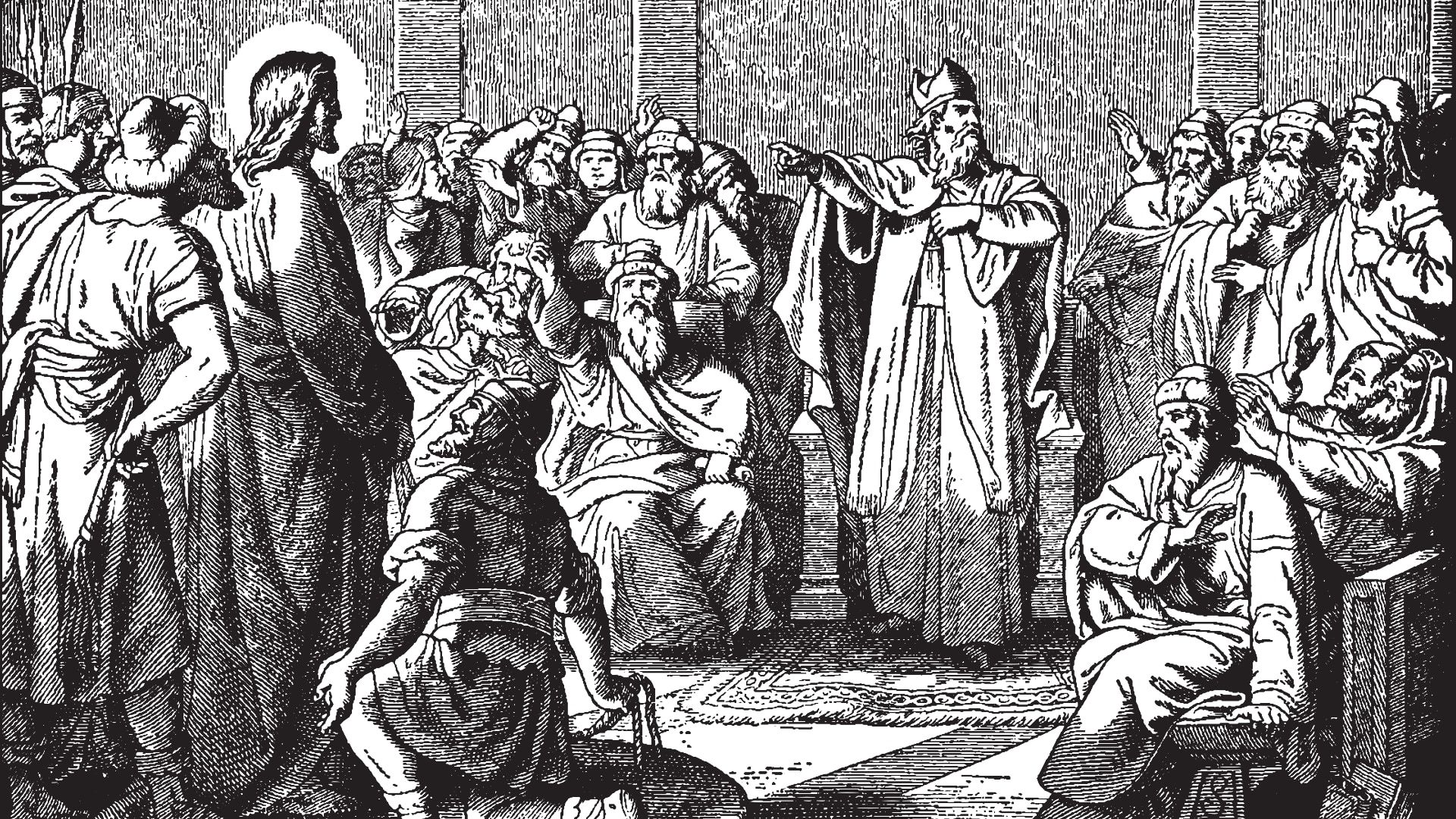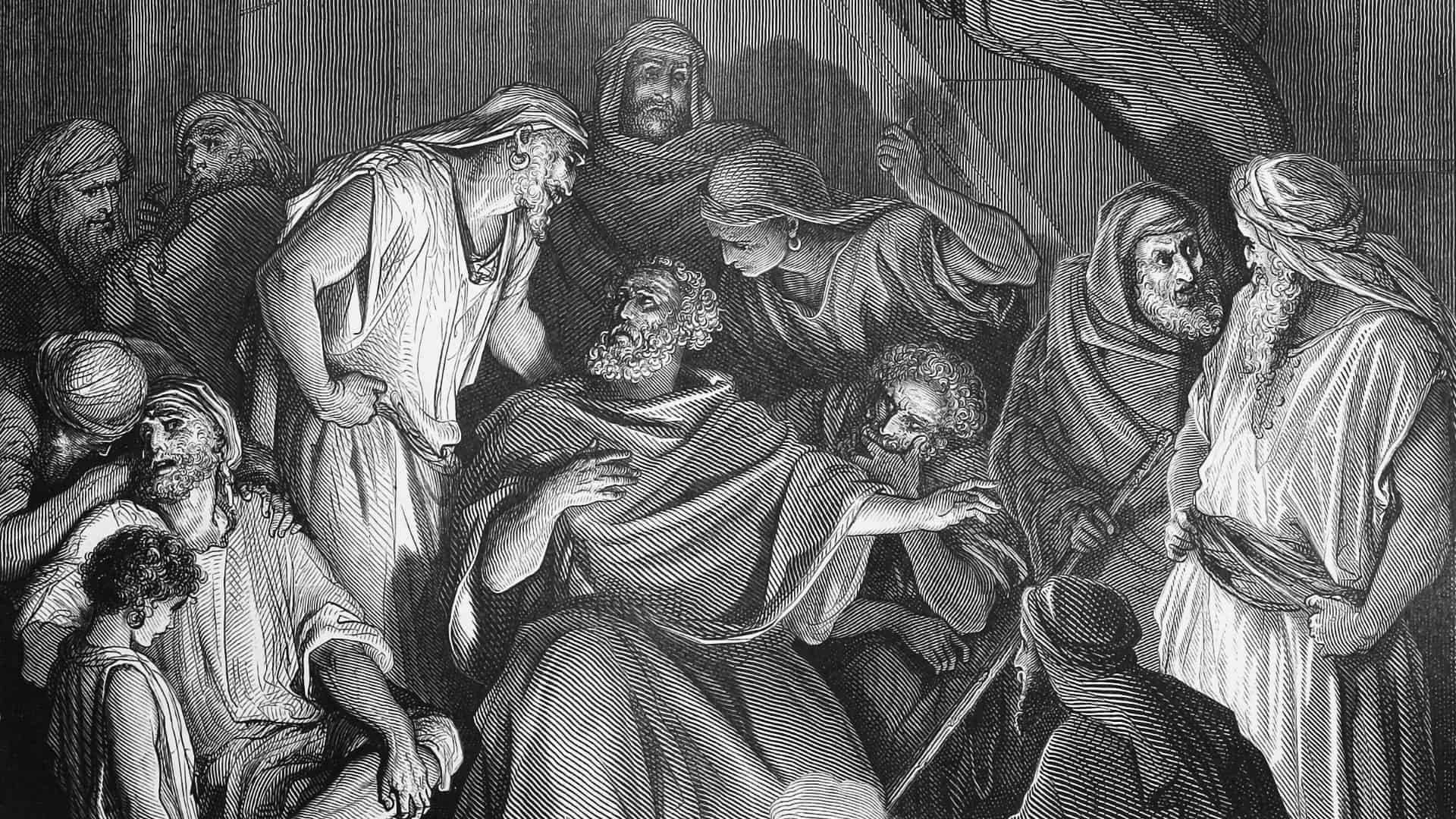The Stone the Builders Rejected (Mark 11:27-12:44)

I’m sure that many of us have enjoyed the Olympics over the past two weeks. We all know that the real event is still to take place later this afternoon. You can enjoy your biathlons and bobsleds and short track speed skating. You can even have your curling, but we all know it’s about the men’s hockey. So today we’ll be glued to our sets seeing who is going to win the gold medal.
I don't want to guess who will win today, but the winning team will have talent and experience. If we gave skates and sticks to a random group of people here today, I'm sure we would do worse than Latvia. They haven't won any games and have been scored against four times more than they've scored. In other words, it’s no accident that teams like the United States and Canada end up near the top. We have the most experience in hockey. We have the deepest pockets of talent.
This may sound like the most obvious observation ever. Except I want to pose a question for you. We’ve been studying the Gospel of Mark, and today we come to a passage in which Jesus is in the Temple. Jesus is in the holiest place. He is at the center of faith and salvation for Jews and Gentiles around the world. Not only that, he is surrounded by the top religious leaders. It feels like being on home ice, where the best religious team is right here. You'd expect Jesus and the religious leaders' conversation to be like a gold medal action, the spiritual equivalent of TED where top minds discuss important ideas. You would think this would be a thing of beauty.
However, it has turned into a disaster. Last week we saw that Jesus took a look at this center of faith and its leaders and condemned it as lifeless. This week, we see Jesus confronting top religious leaders who have dedicated their lives to spiritual matters. You have four different incidents in which the top religious leaders go after Jesus. Jesus uses a story and a question to address the religious leaders before giving them a warning.
To go back to hockey, it’s like if the team that practiced most gets worse and worse the harder they try. It’s like Team Canada being beaten by a bunch of five-year-old Timbits. It’s like the higher they go religiously, the further they move away from God.
This isn’t just an academic question, because there are a lot of us here this morning who are not quite at the level of these religious leaders, but we are pretty religious. This passage is a little like a warning label that comes with a prescription: side effects of religion include the danger that you drift further and further away from Jesus until you’re opposed to him, and he condemns you as spiritually dead.
Because we face this danger, I’d like to ask you to look with me at a story Jesus tells us that will help us understand the danger we face. The story comes in four parts. Not only does it help us understand why religious people end up far from God, it also helps us understand the whole story of Scripture and where we fit into it.
So let’s look at each of the four parts, beginning with part one.
Part One: The Vineyard
Mark 12:1 says:
Jesus then began to speak to them in parables: “A man planted a vineyard. He put a wall around it, dug a pit for the winepress and built a watchtower. Then he rented the vineyard to some farmers and moved to another place.”
The story begins with a vineyard. It’s a great picture, because the people Jesus was addressing would have been familiar with vineyards, and even though we’re not exactly vineyard folk we can picture what this would have been like.
If you’ve done any gardening, you know the kind of work that it takes to turn a piece of land into something productive and beautiful. It takes planning, and then it takes work. Some of us know the opposite. We know it’s not hard to go the other direction: to take something that was a thing of beauty and see it degrade into a wild patch of weeds.
The picture you get in this passage is of a vineyard that has received a great deal of care and attention from the landowner. This was a new vineyard, so it would take at least four years of work before a crop could even be harvested. It’s a vineyard that has a wall, a pit, a winepress, and a watchtower. The owner has gone to a lot of work. He’s invested a lot in this project.
And then he does what was common in those days. He rents out the vineyard to workers who will care for it in his absence. The workers won’t own it; they will simply rent it. The price of rent would be some of the produce from this vineyard.
If you were one of Jesus’ listeners, you may have remembered a similar image from Isaiah 5:
I will sing for the one I love
a song about his vineyard:
My loved one had a vineyard
on a fertile hillside.
He dug it up and cleared it of stones
and planted it with the choicest vines.
He built a watchtower in it
and cut out a winepress as well.
(Isaiah 5:1-2)
What is this about? The vineyard is an image for God’s people, Israel. It is, the Bible tells us, the object of his love and care. God has invested heavily, providing everything that his people need. If you look through Scripture in Genesis, you see that once sin enters the world things go downhill. Everything you can think of happens. It’s like a garden gone wild. It’s all in a state of chaos. But in the middle of that mess God promises Abraham:
I will make you into a great nation,
and I will bless you;
I will make your name great,
and you will be a blessing.
I will bless those who bless you,
and whoever curses you I will curse;
and all peoples on earth
will be blessed through you.
(Genesis 12:2-3)
God keeps this promise, building and preserving a nation, and delivering them from Egypt, leading them into their land. So you have a beautiful picture here of all that God has done to prepare for his people. It’s a care that extends to this day as well, to everyone who here who has heard the gospel and trusted in Christ’s name. God has lavished his care on every one of us.
Part Two: Rebellion
But, Jesus explains, things don’t go well. You get the most of the Old Testament, right up to Jesus’ day, summarized in verses 2 to 5:
At harvest time he sent a servant to the tenants to collect from them some of the fruit of the vineyard. But they seized him, beat him and sent him away empty-handed. Then he sent another servant to them; they struck this man on the head and treated him shamefully. He sent still another, and that one they killed. He sent many others; some of them they beat, others they killed.
Despite all that the owner has done, these people do not respond out of gratitude, nor do they keep their commitments. Instead, there’s a flat-out rebellion against the owner and his messengers. He keeps sending more and more messengers, and things get even worse. They start by beating but pretty soon they’re killing the messengers.
Again, it reminds us of Isaiah 5:
Then he looked for a crop of good grapes,
but it yielded only bad fruit.
“Now you dwellers in Jerusalem and people of Judah,
judge between me and my vineyard.
What more could have been done for my vineyard
than I have done for it?
When I looked for good grapes,
why did it yield only bad?
(Isaiah 5:2-4)
What is this about? Throughout the Old Testament, God had sent prophet after prophet to his people to remind them of the covenant, and to call them back to faithfulness. The people kept ignoring the prophets, and things kept getting worse and worse. The prophet Jeremiah put it this way:
From the time your ancestors left Egypt until now, day after day, again and again I sent you my servants the prophets. But they did not listen to me or pay attention. They were stiff-necked and did more evil than their ancestors. (Jeremiah 7:25-26)
Some of the prophets were killed, like Isaiah, Jeremiah, Ezekiel, Micah, and Amos. The most recent prophet to have been sent and killed was John the Baptist. Jesus had just finished talking about him before telling this story.
What Jesus is saying is that God’s people have a long history of rebellion, of ignoring his prophets. The religious leaders in the temple stood in a long line of people who had rebelled against God. We stand in the same tradition today. One hymn says that we’re prone to wander, prone to leave the God we love. This begins to help us understand where the religious leaders of Jesus day went wrong – and where we can go wrong as well.
Part Three: Rejecting the Son
The story in Isaiah ends at this point. It ends on an awful note.
Now I will tell you
what I am going to do to my vineyard:
I will take away its hedge,
and it will be destroyed;
I will break down its wall,
and it will be trampled.
I will make it a wasteland,
neither pruned nor cultivated,
and briers and thorns will grow there.
I will command the clouds
not to rain on it.
(Isaiah 5:5-6)
Isaiah is talking about foreign invasion here, and national destruction for the nation of Israel.
But Jesus’ story continues, and it takes a shocking turn.
“He had one left to send, a son, whom he loved. He sent him last of all, saying, ‘They will respect my son.’
“But the tenants said to one another, ‘This is the heir. Come, let’s kill him, and the inheritance will be ours.’ So they took him and killed him, and threw him out of the vineyard. (Mark 12:6-8)
What kind of father would risk sending his own son to these rebels after what they had done to all the previous messengers?
And that’s exactly the point. God is that kind of owner. At incredible risk, God makes one final effort, one final appeal to his people. God does not give up on his people. He sends his own Son to them at the risk of his life.
But it’s not just at the risk of the Son’s life. It’s at the cost of that life. Because, as Jesus tells the story, they plot against that his life and take it, and throw the body out of the vineyard. They don’t even give the body the dignity of a proper burial.
This puts the arguments in Mark 11 and 12 in a completely different light. The religious leaders question Jesus’ authority. They ask questions to try to catch Jesus in a trap. They give the appearance of having theological issues with Jesus. But those are a smokescreen for the real issue. The real issue is that they have long been in rebellion against God, and now they are plotting to take the life of God’s very Son.
Mark is telling us that it’s possible to be religious, to even be at the top of the religious heap – gold medalists – and to be in direct opposition to God. It’s possible to be very spiritual, and yet oppose God.
And yet this passage tells us that God goes to every length to rectify the situation, going so far as to send his only Son, even at the risk of his Son’s life.
Part Four: Judgment and Hope
The story ends in this passage – and for us as well this morning – on a dual note. There is a note of judgment as this story ends. “What then will the owner of the vineyard do? He will come and kill those tenants and give the vineyard to others” (Mark 12:9). To put it as simply as possible, to reject Jesus is to choose judgment. This is a horrible thing. To reject Jesus is to choose judgment.
But there’s a stunning twist. Jesus says, “He will come and kill those tenants and give the vineyard to others.” There are going to be new tenants, new beneficiaries of his care. Jesus then quotes a passage of Scripture that is often quoted about Jesus from this point on. It’s apparently about a stone that was rejected as unsuitable as they were building the temple. Yet this very stone, originally rejected, ended up becoming the cornerstone. The one rejected ends up becoming the most important of all.
Haven’t you read this passage of Scripture:
”‘The stone the builders rejected
has become the cornerstone;
the Lord has done this,
and it is marvelous in our eyes’?”
(Mark 12:10-11)
Jesus is saying that even his rejection and upcoming death accomplishes God’s purposes. Jesus’ rejection was foreseen, and God will even use that to bring glory to himself.
Do you see: Jesus is saying that even the most spiritual people, the most faithful attenders of church, can end up as enemies of God. But God has sent his own Son at the cost of that Son’s life so that he could lavish his care on us. To reject Jesus is to choose judgment; to put our trust in Jesus is to receive all of his blessings.
This passage is depressing, because the spiritual gold medalists end up losing not only the game, but everything. But this chapter is encouraging because it ends with two people who unexpectedly seem to get it. One is a religious leader. Jesus says he’s not far from the kingdom. There’s hope even for the religious! The other is the least likely person of all, not a spiritual gold medalist, but a widow who gives everything – literally in the Greek, who gives her whole life, just like Jesus has done for us.
If you’re a spiritual gold medalist, be warned. You’re in danger. But there’s hope for the most unlikely of people. There’s hope for you.





